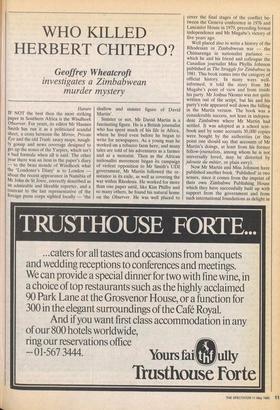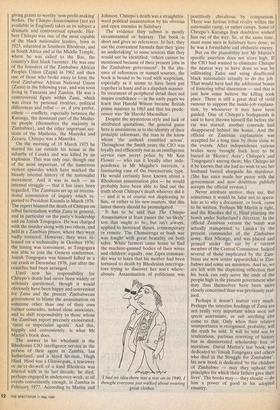WHO KILLED HERBERT CHITEPO?
Geoffrey Wheatcroft investigates a Zimbabwean murder mystery
Harare IF NOT the best then the most striking paper in Southern Africa is the Windhoek Observer. For years, its editor Mr Hannes Smith has run it as a politicised scandal sheet, a cross between the Mirror, Private Eye and the old Truth: saucy snaps, naugh- ty gossip and news coverage designed to get up the noses of the Yarpies, which isn't a bad formula when all is said. The other year there was an item in the paper's diary — to the beau monde of Windhoek what the 'Londoner's Diary' is to London — about the recent appearance in Namibia of Mr John de St Joffe, correctly described as an admirable and likeable reporter, and a contrast to the last representative of the foreign press corps sighted locally — 'the
shallow and sinister figure of David Martin'.
Sinister or not, Mr David Martin is a fascinating figure. He is a British journalist who has spent much of his life in Africa, where he lived even before he began to write for newspapers. As a young man he worked on a tobacco farm here, and many tales are told of his adventures as a farmer and as a motorist. Then as the African nationalist movement began its campaign of violent opposition to Mr Smith's UDI government, Mr Martin followed the re- sistance in its exile, as well as covering the war within Rhodesia. He worked for more than one paper until, like Kim Philby and so many others, he found his natural home on the Observer. He was well placed to cover the final stages of the conflict be- tween the Geneva conference in 1976 and Lancaster House in 1979, preceding formal independence and Mr Mugabe's victory of five years ago.
Well placed also to write a history of the Rhodesian or Zimbabwean war — the Chimurenga in nationalist parlance — which he and his friend and colleague the Canadian journalist Miss Phyllis Johnson published as The Struggle for Zimbabwe in 1981. This book comes into the category of official history. In many ways well- informed, it told the story from Mr Mugabe's point of view and from inside his party. Mr Joshua Nkomo was not quite written out of the script, but his and his party's role appeared well down the billing in the Martin version. The book was a considerable success, not least in indepen- dent Zimbabwe where Mr Martin had settled. It was adopted as a school text- book and by some accounts 30,000 copies were bought by the authorities (at this point one should say that accounts of Mr Martin's doings, at least from his former fellow-journalists, among whom he is not universally loved, may be distorted by jalousie du métier, or plain envy).
Now Mr Martin and Miss Johnson have published another book. 'Published' in two senses, since it comes from the imprint of their own Zimbabwe Publishing House which they have successfully built up with support from the government and from such international foundations as delight in
giving grants to worthy 'non-profit-making' bodies. The Chitepo Assassination (not yet available in England) takes as its subject a dramatic and controversial episode. Her- bert Chitepo was one of the most capable of the black nationalist leaders, born in 1923, educated in Southern Rhodesia, and in South Africa and at the Middle Temple, where he was called to the Bar, the country's first black barrister. He was one of the founders of the Zimbabwe African Peoples Union (Zapu) in 1962 and then one of those who broke away to form the rival Zimbabwe African National Union (Zanu) in the following year, and was soon living in Tanzania and Zambia. He was a controversial figure within Zanu, which was riven by personal rivalries, political differences and tribal — or, if you prefer, ethnic — conflicts, especially between the Karanga, the dominant part of the Masho- na people (themselves the majority in Zimbabwe), and the other important sec- tions of the Mashona, the Manyika and Zezuru. Chitepo was a Manyika.
On the morning of 18 March 1975 he started his car outside his house in the suburbs of Lusaka and was killed by an explosion. This was only one, though one of the most important, of the numerous violent episodes which have marked the bloody internal history of the nationalist movement. And it was as such — an internal struggle — that it has since been 'regarded. The Zambians set up an interna- tional commission of inquiry which re- ported to President Kaunda in March 1976. The report blamed the death of Chitepo on tribal factionalism within Zanu in general, and in particular on the party's leadership and on Josiah Tongogara. He was charged with the murder along with two others, and held in a Zambian prison, where they were badly tortured. However, they were re- leased on a technicality in October 1976; the timing was convenient, as Tongogara was able to join the Geneva conference. Josiah Tongogara was himself killed in a car crash in December 1979, just after the ceasefire had been arranged.
Until now his responsibility for Chitepo's death had never been widely or seriously questioned, though it would obviously have been happy and convenient for Zanu and the present Zimbabwean government to blame the assassination on someone other than one of their own former comrades, indeed close associates, and to shift responsibility to those whom the Zambian report precisely exonerated, 'racist or imperialist agents'. And this, happily and conveniently, is what Mr Martin's book does.
The answer in his whodunit is the Rhodesian CIO intelligence service in the person of their agent in Zambia, Ian Sutherland, and a hired hit-man, Hugh Hind. Hind was a Glaswegian, a tearaway or ne'er-do-well of a kind • Rhodesia was littered with in its last decade; he died, perhaps engaged in undercover work, at all events conveniently enough, in Zambia in February 1977. According to Martin and Johnson, Chitepo's death was a straightfor- ward political assassination by his obvious and open enemies in Salisbury.
The evidence they submit is mostly circumstantial or hearsay. The book is short and gives no references. In fact, they use the convenient formula that they 'gave an undertaking' to some sources that they would not be identified; 'others cannot be mentioned because of their present jobs in the Zimbabwe government'. In the abs- ence of references or named sources, the book is bound to be read with scepticism, especially as it seems to have been put together in haste and in a slapdash manner. Its treatment of peripheral detail does not inspire confidence — in the early pages we learn that Harold Wilson became British prime minister in 1963 and that his prede- cessor was 'Sir Harold Macmillan'.
Despite the mysterious style and lack of attributed quotations, the general guess here is unanimous as to the identity of their principle informant, the man in the know whom 'the author & stumbled across'. Throughout the Smith years the CIO was loyally and efficiently run as an intelligence service cum secret police by Mr Ken Flower — who ran it loyally after inde- pendence in Mr Mugabe's interests, a fascinating case of the bureaucratic type. He would certainly have known about a Rhodesian assassination plot — he would probably have been able to find out the truth about Chitepo's death whoever did it — and it is of course not displeasing to him, or rather to his new masters, that this latest theory should be promulgated.
It has to be said that The Chitepo Assassination at least passes the 'so likely' test that ought to be, but isn't always, applied to historical theses, contemporary or remote. The Chimurenga or bush war was fought with great brutality on both sides. White farmers came home to find
the machine-gunned bodies of their wives and children; equally, one Zipra comman- der was to learn that his mother had been tortured to death by Rhodesian interroga- tors trying to discover her son's where- abouts. Assassination of politicians was '1 had no idea there was a war on in 1940, 1 thought everyone just walked about wearing great clothes.'
postitively chivalrous by comparison. There was furious tribal rivalry within the
nationalist camp, or rather camps. Some of Chitepo's Karanga foes doubtless wished him out of the way. So, at the same time.
must some men in Salisbury have done, as he was a formidable and obdurate enemy. But on the plausibility test Mr Martin's specific assertion does not score high. If the CIO had wanted to eliminate Chitepo the neatest way to have done so was by infiltrating Zanu and using disaffected black nationalists actually to do the job.
That would have had the additional bonus of fostering tribal dissension — and that is just how some believe the killing took place. There is still a great deal of vivid rumour to support ihe inside-job explana- tion, by whomever it may have been guided. One of Chitepo's bodyguards is said to have thrown himself flat before the car was started, another comrade had disappeared behind the house. And the official or Zambian explanation was accepted for a long time by those close to the events. After independence various bodies were brought back here to be buried in 'Heroes' Acre', Chitepo's and Tongogara's among them; Mrs Chitepo let it be known that she had no wish to see her husband buried alongside his murderer. (She has since made her peace with the government and now doubtless publicly accepts the official version.) Never attribute motive, they say. But sometimes it would be false not to specu- late as to why a document, or book, came to be Written. Perhaps Mr Martin is right. and the Rhodies did it, Hind planting the bomb under Sutherland's direction. In the official Zambian version the bomb was actually transported to Lusaka by the present commander of the Zimbabwe army, Rex Nhonge, and was placed and primed under the car by a current member of the Central Committee. Indeed several of those implicated by the Zam- bians are now senior apparatchiki in Zim- babwe and some are ministers. And so, we, are left with the dispiriting reflection that his book can only serve the ends of the people high in the present government who may thus themselves have been more closely concerned than was previously real- ised.
Perhaps it doesn't matter very much. Perhaps the intestine feudings of Zanu are not really very important when seen sub specie aeternitatis, or sub anything else come to that. Only when their relative unimportance is recognised, probably, will the truth be told. It will be told not by tendentious, partisan rewriting of history but in disinterested scholarship free of moralism. David Martin's last book was dedicated to 'Josiah Tongogara and others who died in the Struggle for Zimbabwe'; his new book is dedicated 'to the children of Zimbabwe — may they uphold the principles for which their fathers gave their liveS'. The books may — they should — do him a power of good in his adopted country.















































 Previous page
Previous page